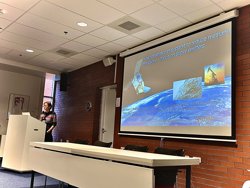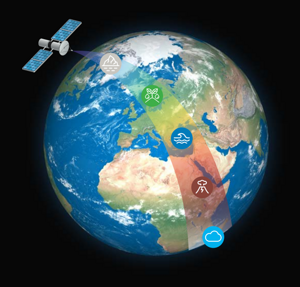Earth Observation Council wants to unite AO researchers with a joint strategy
In the Netherlands, a lot of high-quality scientific research is conducted based on earth observation data. Yet interdisciplinary collaboration on satellite data is still in its infancy. If it is up to the newly established Earth Observation Council, this will soon change. Because a joint strategy can deliver benefits for everyone.
Presentation from Ilse Aben SRON-TROPOMI team
More than eighty scientists from very different disciplines came together in Utrecht last month for the very first Earth Observation Day. Researchers from land, sea, air, ice and the interior of the Earth – from PhD students to professors – discussed an important source of information for them: satellite data.
“The Earth Observation Day was a great success for us,” says co-organizer and chairman of the Earth Observation Council Sander Houweling of the Vrije Universiteit. 'We sensed enthusiasm among the participants to work together and organize joint activities. We therefore want to make Earth Observation Day an annual event. We are also working on a summer school on Earth observation for universities and colleges.'
Joint strategy
The unity that Houweling describes is exactly what Radboud Koop of the NSO had in mind a few years ago. In 2018, NSO, together with NWO and other stakeholders, took the initiative to formulate a joint AO strategy. 'We saw that research using earth observation data in the Netherlands takes place in a very fragmented manner. While the scientists who conduct this research have many common interests. We wondered: if Earth observation scientists work together, could that benefit the entire group?'
In 2021, an extensive study led to the report Earth observation research in the Netherlands, Strategic Plan 2020-2025. This describes how scientists who conduct research into the atmosphere, land, oceans, ice and the solid Earth can work together to gain a stronger position in Europe and worldwide. Moreover, within the Netherlands they would be able to speak with one voice towards the government, NWO and other potential research funders.
New research
The corona pandemic initially led to delays, but in 2023 the Earth Observation Council was established as a direct result of the strategic plan. In addition to atmosphere researcher Houweling from the VU, this currently includes Bert Wouters (TU Delft, cryosphere), Roelof Rietbroek (UT/ITC, land), Femke de Jong (NIOZ, ocean) and Wouter van der Wal (TU Delft, solid earth ). In addition, the council has a number of 'audiences' who represent the NSO, NWO, Surf and eScience Center.
“We see that a lot is being invested in the development of new satellite instruments in our country,” says Houweling. “But it is at least as important to harvest the information and science that these instruments make possible in an efficient manner.” In this way, scientists can sometimes use the same data, which leads to savings in storage capacity and computing power. And interdisciplinary collaboration can lead to entirely new research.

Interdisciplinary collaboration
Houweling: 'Take, for example, the issue of CO2 in relation to the climate. You can only investigate this in the atmosphere, but our Earth system does not work that way. The ocean and land also play an important role in the carbon cycle. There is still a lot to be gained in the Netherlands in terms of cooperation between those disciplines.'
The NSO hopes that the Earth Observation Council will develop further in the coming years, following the example of the Astronomy Council. “Astronomy science also consists of many different disciplines,” says Radboud Koop. 'Yet astronomers are able to formulate clear priorities every five or ten years, including regarding satellite missions, and communicate these to NSO and ESA. The same opportunity exists for Earth observation researchers. If they formulate a joint strategy, we can use it as a basis for Dutch space policy and our efforts at European level.'
Want to learn more?
Earth Observation Council
AO Strategic plan 2020-2025